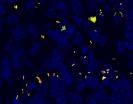(Press-News.org) Certain microbes found in the gut may protect against obesity and diabetes. A study published by Cell Press August 14th in the journal Cell reveals that these microbes shape their hosts' metabolism very early in life and that disrupting them with short-term exposure to antibiotics during infancy can cause metabolic changes that appear to increase the risk of obesity in adulthood. These findings in mice are helping researchers identify which gut bacteria are crucial to metabolic health. Such information could be used to help restore levels of those helpful microbes after an infant has received life-saving antibiotics, thereby promoting healthy metabolism in adulthood.
"We identified infancy as a critical window where host metabolism is especially vulnerable to microbiota disruption with antibiotics," says senior study author Martin Blaser of the NYU Langone Medical Center. "This highlights a need for judicious use of antibiotics in clinical practice in early life."
Microbes begin to colonize the gut at birth, and disruption of these communities with antibiotics early in life can have long-term effects on weight. Farmers have been taking advantage of this phenomenon for decades by exposing livestock to low doses of antibiotics to promote growth. Blaser and his team wanted to examine whether the exact timing and duration of early exposure to antibiotics could make a difference, as well as identify specific bacteria that may protect against the potentially harmful health effects.
To address these questions, the researchers gave long-term, low-dose penicillin treatment to two groups of mice: 4-week-old mice after weaning and mouse mothers beginning shortly before their pups' birth. They found that earlier penicillin exposure led to more substantial obesity in adulthood and worse metabolic health, especially in males. Early exposure to antibiotics also reduced levels of several types of potentially protective bacteria and exacerbated the effects of a high-fat diet on obesity. In a separate experiment, the researchers found that only 4 weeks of antibiotic exposure beginning shortly before birth was sufficient to produce obesity, which lasted well after penicillin treatment ended.
Moreover, the researchers demonstrated that altered gut microbes rather than antibiotics per se caused these metabolic changes: "Our findings imply that restoring good bacteria could prevent the long-term metabolic effects of early antibiotic exposure," says lead study author Laura Cox of the NYU Langone Medical Center. "We identified four candidate bacteria that may be metabolically protective, and we're working on follow-up studies to determine if we can prevent weight gain by giving these bacteria back following antibiotic therapy."
INFORMATION:
Cell, Cox et al.: "Altering the intestinal microbiota during a critical developmental window has lasting metabolic consequences.
Disruption of gut bacteria early in life can lead to obesity in adulthood
2014-08-14
ELSE PRESS RELEASES FROM THIS DATE:
New shock-and-kill approach could eradicate barrier to curing HIV
2014-08-14
Despite tremendous progress in combatting HIV-1 infection with antiretroviral therapy, there is still no cure for the disease because these drugs do not kill a hidden reservoir of infected cells in the body. A study published by Cell Press August 14th in the journal Cell reveals a multipronged strategy for eradicating this latent reservoir and preventing HIV-1 from rebounding after treatment is stopped in mice. The findings suggest that a "shock-and-kill" approach involving the activation of dormant viruses with drugs called inducers, combined with virus-fighting antibodies, ...
Early antibiotic exposure leads to lifelong metabolic disturbances in mice
2014-08-14
VIDEO:
Martin Blaser, M.D., and Laura Cox, Ph.D., discuss their work on early antibiotic exposure in mice.
Click here for more information.
NEW YORK, August 14, 2014 — A new study published today in Cell suggests that antibiotic exposure during a critical window of early development disrupts the bacterial landscape of the gut, home to trillions of diverse microbes, and permanently reprograms the body's metabolism, setting up a predisposition to obesity. Moreover, the study shows ...
Computation and collaboration lead to significant advance in malaria
2014-08-14
HOUSTON – (August 14, 2014) -- Researchers led by Baylor College of Medicine have developed a new computational method to study the function of disease-causing genes, starting with an important new discovery about a gene associated with malaria – one of the biggest global health burdens.
The work published today in the current issue of the journal Cell includes collaborators comprised of computational and evolutionary biologists and leading malaria experts from Baylor, Columbia University Medical Center, Princeton University, Pennsylvania State University and the National ...
Researchers identify a brain 'switchboard' important in attention and sleep
2014-08-14
VIDEO:
Michael Halassa, M.D., Ph.D. discusses his work with the thalamic reticular nucleus (TRN) and it's importance in identifying new targets for treating various psychiatric disorders like schizophrenia, autism and post-traumatic...
Click here for more information.
New York City, August 14, 2014 - Researchers at NYU Langone Medical Center and elsewhere, using a mouse model, have recorded the activity of individual nerve cells in a small part of the brain that works as a "switchboard," ...
Genetic signal prevents immune cells from turning against the body
2014-08-14
LA JOLLA—When faced with pathogens, the immune system summons a swarm of cells made up of soldiers and peacekeepers. The peacekeeping cells tell the soldier cells to halt fighting when invaders are cleared. Without this cease-fire signal, the soldiers, known as killer T cells, continue their frenzied attack and turn on the body, causing inflammation and autoimmune disorders such as allergies, asthma, rheumatoid arthritis, multiple sclerosis and type 1 diabetes.
Now, scientists at the Salk Institute have discovered a key control mechanism on the peacekeeping cells that ...
Common mutation successfully targeted in Lou Gehrig's disease and frontotemporal dementia
2014-08-14
JUPITER, FL, August 14, 2014 – An international team led by scientists from the Florida campuses of The Scripps Research Institute (TSRI) and the Mayo Clinic have for the first time successfully designed a therapeutic strategy targeting a specific genetic mutation that causes a common form of amyotrophic lateral sclerosis (ALS), better known as Lou Gehrig's disease, as well a type of frontotemporal dementia (FTD).
The scientists developed small-molecule drug candidates and showed they interfere with the synthesis of an abnormal protein that plays a key role in causing ...
Scientists use lasers to control mouse brain switchboard
2014-08-14
VIDEO:
Scientists studied how just a few nerve cell in the mouse brain may control the switch between internal thoughts and external distractions. Using optogenetics, a technique that uses light-sensitive molecules...
Click here for more information.
Ever wonder why it's hard to focus after a bad night's sleep? Using mice and flashes of light, scientists show that just a few nerve cells in the brain may control the switch between internal thoughts and external distractions. The ...
Long antibiotic treatments: Slowly growing bacteria to blame
2014-08-14
Whether pneumonia or sepsis – infectious diseases are becoming increasingly difficult to treat. One reason for this is the growing antibiotic resistance. But even non-resistant bacteria can survive antibiotics for some time, and that's why treatments need to be continued for several days or weeks. Scientists at the Biozentrum of the University of Basel showed that bacteria with vastly different antibiotic sensitivity coexist within the same tissue. In the scientific journal Cell they report that, in particular, slowly growing pathogens hamper treatment.
Many bacteria ...
Tissue development 'roadmap' created to guide stem cell medicine
2014-08-14
In a boon to stem cell research and regenerative medicine, scientists at Boston Children's Hospital, the Wyss Institute for Biologically Inspired Engineering at Harvard University and Boston University have created a computer algorithm called CellNet as a "roadmap" for cell and tissue engineering, to ensure that cells engineered in the lab have the same favorable properties as cells in our own bodies. CellNet and its application to stem cell engineering are described in two back-to-back papers in the August 14 issue of the journal Cell.
Scientists around the world are ...
Antibodies, together with viral 'inducers,' found to control HIV in mice
2014-08-14
Although HIV can now be effectively suppressed using anti-retroviral drugs, it still comes surging back the moment the flow of drugs is stopped. Latent reservoirs of HIV-infected cells, invisible to the body's immune system and unreachable by pharmaceuticals, ensure that the infection will rebound after therapy is terminated.
But a new strategy devised by researchers at Rockefeller University harnesses the power of broadly neutralizing antibodies against HIV, along with a combination of compounds that induce viral transcription, in order to attack these latent reservoirs ...





